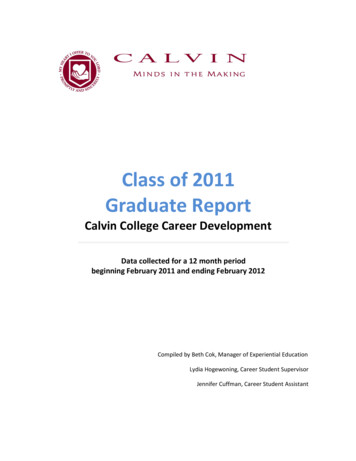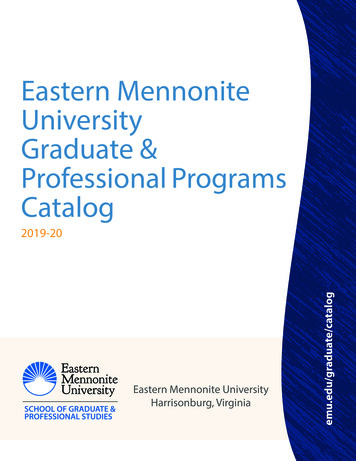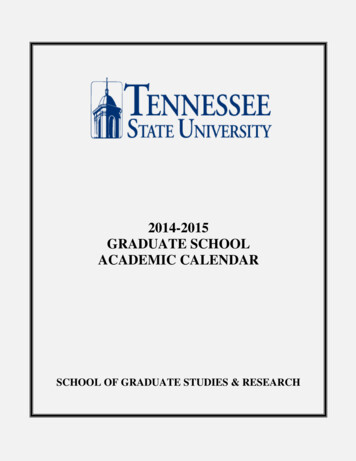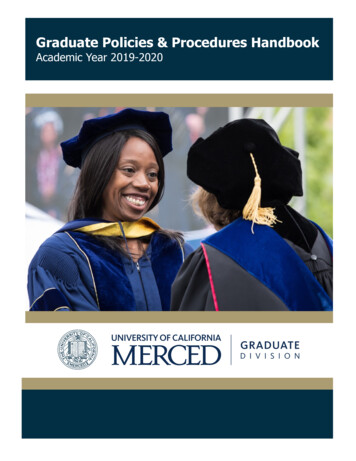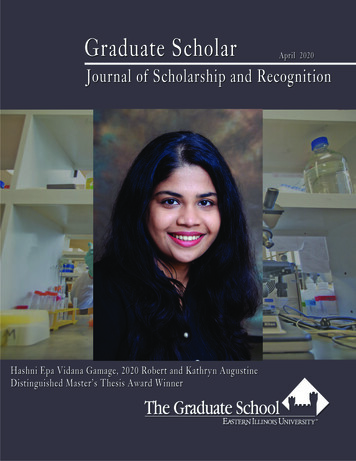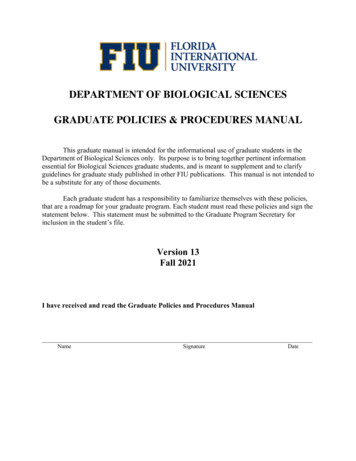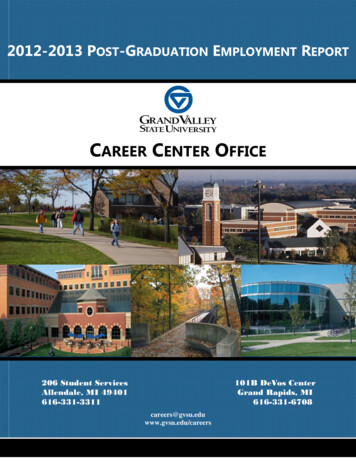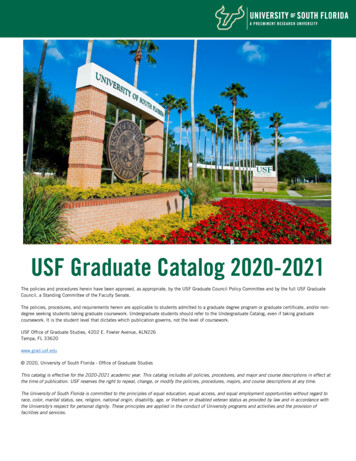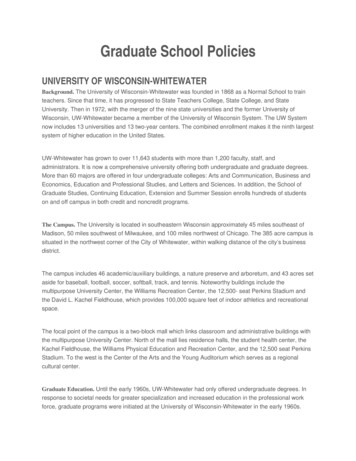
Transcription
Graduate School PoliciesUNIVERSITY OF WISCONSIN-WHITEWATERBackground. The University of Wisconsin-Whitewater was founded in 1868 as a Normal School to trainteachers. Since that time, it has progressed to State Teachers College, State College, and StateUniversity. Then in 1972, with the merger of the nine state universities and the former University ofWisconsin, UW-Whitewater became a member of the University of Wisconsin System. The UW Systemnow includes 13 universities and 13 two-year centers. The combined enrollment makes it the ninth largestsystem of higher education in the United States.UW-Whitewater has grown to over 11,643 students with more than 1,200 faculty, staff, andadministrators. It is now a comprehensive university offering both undergraduate and graduate degrees.More than 60 majors are offered in four undergraduate colleges: Arts and Communication, Business andEconomics, Education and Professional Studies, and Letters and Sciences. In addition, the School ofGraduate Studies, Continuing Education, Extension and Summer Session enrolls hundreds of studentson and off campus in both credit and noncredit programs.The Campus. The University is located in southeastern Wisconsin approximately 45 miles southeast ofMadison, 50 miles southwest of Milwaukee, and 100 miles northwest of Chicago. The 385 acre campus issituated in the northwest corner of the City of Whitewater, within walking distance of the city’s businessdistrict.The campus includes 46 academic/auxiliary buildings, a nature preserve and arboretum, and 43 acres setaside for baseball, football, soccer, softball, track, and tennis. Noteworthy buildings include themultipurpose University Center, the Williams Recreation Center, the 12,500- seat Perkins Stadium andthe David L. Kachel Fieldhouse, which provides 100,000 square feet of indoor athletics and recreationalspace.The focal point of the campus is a two-block mall which links classroom and administrative buildings withthe multipurpose University Center. North of the mall lies residence halls, the student health center, theKachel Fieldhouse, the Williams Physical Education and Recreation Center, and the 12,500 seat PerkinsStadium. To the west is the Center of the Arts and the Young Auditorium which serves as a regionalcultural center.Graduate Education. Until the early 1960s, UW-Whitewater had only offered undergraduate degrees. Inresponse to societal needs for greater specialization and increased education in the professional workforce, graduate programs were initiated at the University of Wisconsin-Whitewater in the early 1960s.
Since then, UW-Whitewater has granted 15,138 master’s degrees. It is presently the third largestgraduate school in the UW System with 1,279 students enrolled during the fall of 2012.Master’s degree programs are available in accounting, business administration, business education,communication, communication sciences & disorders, counseling, educational leadership & policyanalysis, occupational & environmental safety & health, professional development, school businessmanagement, school psychology, and special education. An extensive program of evening and onlineclasses is offered for those who are employed during the day. It is possible to complete some master’sdegree programs through summer and evening work without being a full-time student during theacademic year.Graduate certificate programs are available in business administration, safety, counseling, and specialeducation.Graduate degree programs at UW-Whitewater are fully accredited by the North Central Association, theAmerican Assembly of Collegiate Schools of Business, the American Speech-Language-HearingAssociation, the National Council for Accreditation of Teacher Education, and the Wisconsin StateDepartment of Public Instruction.Information on specific degree programs is found in the Degree Programs section of this catalog. Forfurther information on admission to graduate studies contact: School of Graduate Studies, Roseman2013, University of Wisconsin-Whitewater, Whitewater, WI 53190; (262) 472-1006; or visit our website athttp://grad.uww.eduSafety and Health Policy. The University of Wisconsin System will provide and maintain adequate facilitiesfor a safe and healthy learning environment. It is the University’s responsibility to work with faculty andstaff so that they are equipped to educate their students on practices and procedures that ensure safetyfor all members of the university. Employees with instructional responsibilities are expected to complywith state and federal safety laws and regulations in their institutional areas. Certain courses andresearch projects require that the student work with hazardous materials while engaging in academicstudies. Instructors of these courses and research projects shall inform and train students on proceduresthat will maintain the students’ personal health and safety and provide them with information on thehazards of specific chemicals that will be used during their course of study. Furthermore, instructors willenforce and follow safety policies. Prior to use of hazardous materials and equipment, the student shallreview the procedures and information, and discuss any associated concerns with the instructor.Graduate Education
Graduate education at the University of Wisconsin-Whitewater uses knowledge and skills acquiredthrough baccalaureate degrees and professional experiences as a foundation for advanced-level studyand professional development. The goal of graduate education is to prepare individuals to apply anadvanced knowledge-base and refined analytic, communicative, and functional skills to problemsencountered in their professional careers.Graduate courses are taught by individuals who have earned "graduate faculty" status or have beenapproved by the graduate faculty of a department and the Dean of the School of Graduate Studies andContinuing Education. Together these are individuals who are active scholars and productiveprofessionals equipped to pass along timely experiences and knowledge about their evolving discipline.Graduate course work, generally, will introduce students to contemporary issues in the discipline and helpthem develop a critical perspective for evaluating these and future developments. Graduate course workwill help students develop an understanding for how a discipline is organized and how it conducts itsresearch. In that regard, graduate course work is designed to be significantly different from itsundergraduate counterpart in the following ways:o requiring a greater depth and intensity of study;o demanding a higher level of academic/intellectual rigor;o focusing primarily on advanced and specialized topics;o exploring the integration of theory and practice; ando relying on pedagogical practices that require moreo personal interactions with the instructor, more collaborative interactions with fellow graduate students, andmore self-directed learning than undergraduate studies.Academic Assessment. Academic assessment is a process where academic programs: 1) articulate aset of knowledge-based, cognitive-based, and skill-based objectives defining the competencies thatstudents will acquire in completing the curriculum; 2) collect data from students, alumni, alumniemployers, and other sources that allow it to assess the competency level of its graduates relative to itsoutlined objectives; 3) utilize the assessment data to make revisions to the curriculum, pedagogicalprocesses, evaluation procedures, and/or program objectives; and 4) share their assessment results withfaculty, students, and alumni. Assessment helps the programs achieve one of the most important anddifficult challenges facing the modern university: providing curricula that are well-focused, timely, anddesigned and delivered in such a way that they prepare graduates to be creative, successfulprofessionals.Graduate education at UW-Whitewater runs its academic assessment at two levels. At one level, eachgraduate program engages in the four steps outlined above. To assist with the data collection, students inthe various programs may be asked to assemble portfolios of their work, or may have their thesis orcomprehensive exams assessed by a committee of faculty, and/or they may be asked to complete an exitinterview.
At a comprehensive level, the School of Graduate Studies requires all students completing a degreeprogram to complete an exit survey. These surveys provide an ongoing chronicle of student perceptionsthat are used to assess how well graduate programming is achieving the five comprehensive objectivesthat characterize the desired outcomes of all graduate programs.GRADUATE ADMISSION PROGRAM REQUIREMENTSIn general, all persons who hold a bachelor’s or advanced degree from a regionally accredited schoolmay register in graduate-level courses for graduate credit. Proof of a bachelor’s or higher degree isrequired.Students may be admitted to a graduate degree program either in good standing or on probation. Theadmission status (e.g., "good standing" vs. "probation") of all applicants from baccalaureate-grantinginstitutions that don't employ traditional grading systems will be left to the judgment and recommendationof the graduate program to which the student is applying. Certain other special categories are establishedfor persons not attempting to complete a degree at this institution. These special categories are"noncandidate for degree" and "guest transfer of credit."Effective fall 2007, individuals who have earned bachelor degrees created in accordance with the European HigherEducation Area (i.e., Bologna Process), or earned bachelor degrees from institutions engaged in a formalagreement with UW-W, will be considered admission eligible providing their academic performance in completingthat degree is emblematic of future success in a graduate program (i.e., eligible to be admitted in "good standing").Admission in Good Standing. Requirements for admission to a degree program in good standing are asfollows:1.A baccalaureate or higher degree from a regionally accredited institution.2.At least a 3.00* overall grade point average in all the graduate work previously completed at UW-Whitewater, with nogrades of I or IP pending.3.4.One of the following:1.At least a 2.75 overall grade point average in the undergraduate degree program.2.At least a 2.90 grade point average in the last half of the undergraduate degree program.3.A master's degree or higher from an institution regionally accredited at the corresponding graduate level.4.At least 12 credits of graduate work completed on a regular grade basis at UW-Whitewater.Any additional requirements set by individual departments or colleges for admission to specific degree programs.*All grade point averages are on a 4.00 basis.
Deficiencies in Background for Graduate Study. If a department finds that a student lacks the properacademic background for graduate studies, it may specify that deficiencies be made up before thestudent completes a degree. In some cases, deficiencies may have to be made up by registering inundergraduate courses that do not count toward completion of a master’s degree.Admission on Probation. A student who does not meet the requirements for admission in good standingmay be admitted to a degree program on probation after furnishing credible evidence of ability to dosatisfactory graduate work.Such credibility is determined by the admitting academic department or individual program coordinator,and could be a creditable postgraduate employment record; a satisfactory score on the Graduate RecordExamination, GMAT or Miller Analogies Test; or the successful completion of graduate work at aregionally accredited institution.Students admitted on probation must meet the criteria above for good standing status within the first 12units attempted, including repeated courses. Those failing to do so will be ineligible to take furthergraduate work in that degree program.NON-DEGREE SEEKING PROGRAMSNoncandidate for Degree (NCFD). Persons who hold a bachelor’s degree or a graduate degree from aregionally accredited college or university but do not wish to be admitted to a graduate degree programare classified as NCFD students. Evidence of a bachelor’s degree or an advanced degree is required foran NCFD student. This category allows the student to enroll in graduate level courses and to receivegraduate credit for this work. Departments and colleges reserve the right to restrict NCFD students fromtheir courses.Before attempting more than 12 units as an NCFD, a student is encouraged to file an application for adegree program. Acceptance of any course work toward a graduate degree, including course workcompleted as an NCFD student, is at the discretion of the department. Because a graduate degreerequires that the student complete a program of courses planned in consultation with an adviser,generally two-thirds or more of the course work must be completed after formal admission to the degreeprogram. Consequently, a maximum of twelve units taken prior to admission to the program may beapplied toward the completion of a degree.Guest Transfer of Credit.Persons attending another graduate school who wish to take graduate courses atUW-Whitewater and transfer them to that institution may do so. The request for guest matriculant statusform is to be completed by an official of the graduate school to which the units are to be transferred. Theform certifies that the student is attending the other institution and states the provisions for approval of thework taken at UW-Whitewater toward the degree at the other institution. Students may download the
Request for Guest Matriculant Status form at http://www.uww.edu/gradstudies/ or contact the GraduateStudies Office.Seniors Taking Graduate Courses. UW-Whitewater undergraduate students with senior status may beallowed to complete up to nine graduate units at UW-Whitewater provided they have completed at least90 semester units with at least a 2.75 overall grade point average (or 2.90 over the last half of theircourse work), have the written recommendation of the department chairperson of their undergraduatemajor and have a graduate application on file in the Graduate Studies Office. Students may download thisform at igibility for this privilege must be established with the graduate program coordinator and GraduateStudies Office and is not available to seniors at other institutions or students who already possess abachelor's degree. Seniors may not use graduate-level units to satisfy requirements for the bachelor'sdegree, and undergraduate fees will be charged for their graduate-level work.APPLICATION PROCESSApplication to Degree Programs. To apply for admission to a graduate degree program, individuals must:1.Submit a completed application and 56 application fee. Available at http://www.uww.edu/gradstudies/ or from theGraduate Studies Office.2.All requests to transfer and/or apply previously taken graduate course work toward the degree requirements must besubmitted at the time of application. Transfer credit forms may be obtained by visiting http://www.uww.edu/gradstudies/.3.Submit an official degree-bearing transcript from the institution that granted the bachelor’s degree and that includes at least60 semester hours of course work. If fewer than 60 semester hours of course work were completed at the degree-grantinginstitution, additional transcripts will be required.4.In addition to the official bachelor's degree-bearing transcript, submit copies of transcripts for all undergraduate work thatwas applied to the bachelor's degree, if that course work was not included in the degree-bearing transcript. These transcriptsmay be unofficial copies and may be submitted by the applicant.5.Submit, directly from the granting institution, an official transcript showing completion of any master's or higher degrees.6.Submit, directly from the granting institution, official transcripts for any other graduate work completed, if the work is to beconsidered for transfer into the student's degree program. If official transcripts for previously completed graduate work arenot provided at the time of application to the program, credit for that work cannot be transferred at a later date.7.Have official transcripts sent directly from the registrar's office at the institution where the work was completed to:School of Graduate StudiesRoseman 2013 UW-WhitewaterWhitewater, WI 53190.(Note: Transcripts from UW-Whitewater will be ordered by the Graduate School.)Transcripts faxed to UW-Whitewater or submitted personally by applicants will not be accepted.
In the case of an institution in a foreign country that does not issue transcripts other than the singleofficial copy presented to the student, a photocopy may be submitted provided that the applicantpresents the official document for verification of authenticity at the Graduate Studies Office uponarrival at UW-Whitewater. A hold will be placed on their record until this is provided.8.Submit all other credentials (e.g., test scores, letters of recommendation, goal statement, autobiography) required foradmission to the particular program for which admission is being sought.IN ADDITION, INTERNATIONAL STUDENTS MUST:9.All international applicants to graduate programs must submit an official course-by-course evaluation of all foreigneducation credentials. Acceptable international credential evaluation agencies include: Educational Credential Evaluators, lnc.(414) 289-3400 (ece.org)World Educational Services, 212-966-6311 (wes.org)or any NACES accredited evaluation service (naces.org)10. All international applicants to graduate programs must provide evidence of Advanced Academic English Languageproficiency, which may be documented by one of the following: The TOEFL score is required by those whose native language is other than English. Official results mustbe sent directly from the Educational Testing Service. A TOEFL score of 79 (internet-based) is requiredfor admission into some degree programs and is strongly recommended by others.or An official International English Language Testing System (IELTS) score is acceptable. The minimumrequired score is 6.0.or Completion of advanced academic language study at the University of Wisconsin-Whitewater IntensiveEnglish re/intensive-english-institute). Students must completeEnglish 161 ( Advanced Academic Reading) and English 162 (College Writing in English as a SecondLanguage) in the UWWhitewater Intensive English Institute with a score of 80% or higher in each course.or Completion of advanced academic language study at the Wisconsin English Second Language Institute(WESLI: https://www.wesli.coml). Students must complete the institute's 700 level, including academicreading and writing, and academic listening and speaking skills, with a rating of "very good" or higher (3,3 , or 4). Students must arrange to have these results and a recommendation from WESLI forwarded to the
UW-Whitewater School of Graduate Studies.or Completion of advanced academic language study at the Madison as a Second Language School(MESLS: http://www.mesls.org). Students must have MESLS provide a letter documenting successfulcompletion of MESLS's advanced-level (level six) Speaking and Grammar, Reading & Writing, andSpeaking & Listening courses, earning, at least, an "AB" average overall, and no lower than a "8" in anysingle course. Students must arrange to have these results and a recommendation from MESLS forwardedto the UW-Whitewater School of Graduate Studies.or Completion of advanced academic language study at the University of Wisconsin-Stevens Point English asa Second Language program (uwsp.edu/ESUPages/default.aspx). Students must provide a letter ofrecommendation and completion of Level 4 (Advanced) coursework at UW-Stevens Point English as aSecond Language program with a score of 80% or higher forwarded to the UW-Whitewater School ofGraduate Studies.or Documentation from an Intensive English Institute accredited by CEA (the Commission on EnglishLanguage Program Accreditation) or affiliated with a U.S. university of completion of advanced academiclanguage study coursework will also be considered on a case-by-case basis.Applicants are exempt from having to demonstrate the Advanced Academic English Language Proficiencyrequirement if they: have earned a bachelor’s degree from an English-speaking country (click here) have attended a U.S. college or university continuously for more than one year or have a completed U.S.undergraduate degree. have received an undergraduate degree from a foreign institution where English is the language ofinstruction. have resided and worked in the U.S. for more than one year without being a student.11. Send a completed certification of finances form to the School of Graduate Studies to demonstrate that there is adequatefinancial support available during the planned period of study. Forms are located at http://www.uww.edu/gradstudies.12. Have a former professor send a letter of recommendation directly to the School of Graduate Studies attesting to the student'sability to pursue graduate study in the United States.Reactivation. Applicants who do not enroll in graduate course work at UW-Whitewater within a calendaryear of the beginning of the term for which they were admitted and students who have not enrolled ingraduate course work within a calendar year are considered inactive. Inactive students and students whohave completed their degree programs must update and reactivate their files by completing a reactivation
form before they will be eligible to register for graduate courses. Forms are availableat http://www.uww.edu/gradstudies/.Transfer of Credit. All course work, with the exception of up to nine units, must be completed at UWWhitewater. Additional course work taken at other institutions may allow specific program requirements tobe waived; however, no more than nine transfer units may be applied towards the unit requirements of adegree program. Some specific consortium arrangements between UW-Whitewater and other institutionsmay allow more than nine units to be completed at the participating institutions.Units for a course completed at another institution may be transferred to UW-Whitewater and appliedtoward a graduate degree provided (1) the institution offering the course is regionally accredited at thegraduate level, (2) the course appears as a graduate course on the student's graduate transcript from theinstitution offering the course, (3) the course is applicable toward a graduate degree at the institutionoffering the course, (4) the course is appropriate for the student's proposed graduate degree program atUW-Whitewater, (5) the course is not a correspondence course, nor was it taught in a format less rigorousthan that for UW-Whitewater courses, and (6) the student earned a grade of at least B (3.00) for thecourse (B- is less than a 3.00 and will not be transferable). All requests to apply course work taken by astudent prior to being accepted into a degree program at UW-Whitewater toward the degree requirementsmust be included in the application for admission to the degree program.Students who have already been admitted to a degree program here and who wish to take a course atanother institution and have it transferred to UW-Whitewater, must obtain permission prior to enrolling inthe course. Forms for this prior approval are available at http://www.uww.edu/gradstudies/index.php. Theinstitution at which the student wishes to earn graduate credit may also require documentation of thestudent's graduate status at UW-Whitewater.Questions for the comprehensive examination for the master's degree may be included from coursesaccepted in transfer to UW-Whitewater. Students should contact their degree program coordinator aboutthis matter.The 12 unit limit on courses taken prior to program admission does not apply to changes in emphasiswithin any of the degree programs.Submission. All application credentials must be sent to the School of Graduate Studies, Roseman 2013,UW-Whitewater, Whitewater, Wisconsin 53190-1790.Application Material Policy. Admission materials become the property of the University and are notreturned to applicants or forwarded to other institutions.
Deadlines. Applications will not be processed until all of the above credentials have been received. Allapplication material (including transcripts and other material that may be required) must be received atleast 45 days prior to the start of classes to be considered for admission for a given term.Please note: Individual programs may have earlier deadlines. Information on deadlines for specific degreeprograms is found in the Degree Programs section of this catalog.In order to ensure receipt of all application materials by the deadline, applications should be submitted atleast three months before the beginning of the term the applicant plans to attend. Applications received orcompleted fewer than 45 days prior to the start of classes will be considered for admission for thefollowing term.Students whose applications for program admission are pending may enroll in course work asnoncandidate for degree students, but are subject to the twelve unit limit on course work that may betaken prior to the term of a program admission and then applied toward the completion of a degree.Pending Degree-Bearing Transcripts. Application for admission will be considered during the applicant'slast term of undergraduate study; however, admission will be conditional upon the applicant attaining thebaccalaureate degree and meeting all the requirements for admission.Acceptance. After application credentials have been evaluated, students will be notified of their admissionstatus. If accepted into a degree program, they will be assigned an adviser and sent an admission letter.The letter will include an assigned student ID number and information on how to register for courses.Advising. Students are assigned faculty advisers by, and generally within, their major or emphasisdepartment. Advisers are available to help plan each student's program of study and to assist in theselection of courses before students register for classes.Graduate students who seek state professional education licensure should also contact the Director ofLicensure for current licensure requirements. See section on Admission to Professional Education in thiscatalog.ACADEMIC INFORMATION
In addition to the graduate school academic requirements and policies, it is the prerogative of eachgraduate degree program to impose more stringent requirements. A graduate student is responsible formeeting all degree requirements in effect at UW-Whitewater during the term for which the student isadmitted into the current degree program unless the student’s attendance at UW-Whitewater isinterrupted by an absence of four or more consecutive academic sessions (including summers), in whichcase upon reentry, the student will be subject to the requirements in effect at that time.General graduate school academic requirements and policies (contained in this section) may be changedby the actions of the Graduate Council. Each graduate student is responsible for adhering to all currentgraduate school policies. Students are apprised of updated graduate policies through the schedule ofclasses. Information about changes in general graduate school policies is also availableat http://www.uww.edu/gradstudies/ or contact the Graduate Studies Office.Academic Probation. Students in degree programs who fail to maintain at least a 3.00 overall grade pointaverage for all graduate work completed at UW-Whitewater are placed on academic probation. A studenton academic probation must attain at least a 3.00 overall grade point average within the next 12 graduateunits attempted at UW-Whitewater (including courses that are repeated) in order to be returned to goodstanding status. Failure to accomplish this will result in the student being dropped from the degreeprogram with ineligibility to take further graduate work in that degree program.Time Limit. Domestic students have seven years and international students have two years in which tocomplete their degree program, measured from the beginning of the term in which the first course to beincluded in the degree was completed, but not later than the beginning of the term for which they wereadmitted. Based upon good cause, students may request an extension of this time limit. Such requestsshould be made in writing, should include the reasons for which the request is being made, and should bedirected to the student’s degree program coordinator.Requests for extensions not exceeding two additional years will be considered and acted upon by thefaculty of the degree program or the degree program coordinator. Requests for extensions beyond twoadditional years will be considered, with the recommendation of the program coordinator, by the School ofGraduate Studies. Requests for extensions beyond those additional two years will be considered only incases of extreme and unavoidable hardship; such requests must also be acted upon by the Committeeon Exceptions to Graduate Policy, and must carry the endorsement of the degree program coordinator.All student requests for extensions are reported by degree program coordinators to the Graduate StudiesOffice on the appropriate form.Licensure. Many degree programs allow students to attain licensure within the degree program. However,licensure requirements are different from degree requirements. Questions about licensure should bedirected to the Licensure Office. Please see the section on Admission to Professional Education in thiscatalog for more information.
Course Repeats. Graduate students are allowed to repeat at most two courses in their degree programs.Cour
UW-Whitewater has grown to over 11,643 students with more than 1,200 faculty, staff, and . 50 miles southwest of Milwaukee, and 100 miles northwest of Chicago. The 385 acre campus is . institutions that don't employ traditional grading systems will be left to the judgment and recommendation
